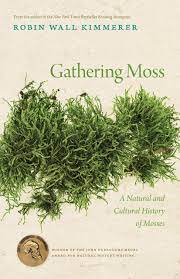Search Results: Returned 3 Results, Displaying Titles 1 - 3
-
-
2013., Milkweed Editions Call No: IND 305.8 K49b Availability:1 of 1 At Your Library Summary Note: An inspired weaving of indigenous knowledge, plant science, and personal narrative from a distinguished professor of science and a Native American whose previous book, Gathering Moss, was awarded the John Burroughs Medal for outstanding nature writing. As a botanist and professor of plant ecology, Robin Wall Kimmerer has spent a career learning how to ask questions of nature using the tools of science. As a Potawatomi woman, she learned from elders, family, and history that the Potawatomi, as well as a majority of other cultures indigenous to this land, consider plants and animals to be our oldest teachers. In Braiding Sweetgrass, Kimmerer brings these two lenses of knowing together to reveal what it means to see humans as "the younger brothers of creation." As she explores these themes she circles toward a central argument: the awakening of a wider ecological consciousness requires the acknowledgement and celebration of our reciprocal relationship with the world. Once we begin to listen for the languages of other beings, we can begin to understand the innumerable life-giving gifts the world provides us and learn to offer our thanks, our care, and our own gifts in return.
-
-
2016., 16:44:37, Tantor Audio Edition: Unabridged. Click to access digital title. Sample Summary Note: As a botanist and professor of plant ecology, Robin Wall Kimmerer has spent a career learning how to ask questions of nature using the tools of science. As a Potawatomi woman, she learned from elders, family, and history that the Potawatomi, as well as a majority of other cultures indigenous to this land, consider plants and animals to be our oldest teachers. In Braiding Sweetgrass, Kimmerer brings these two lenses of knowing together to reveal what it means to see humans as "the younger brothers of creation." As she explores these themes, she circles toward a central argument: The awakening of a wider ecological consciousness requires the acknowledgement and celebration of our reciprocal relationship with the world. Once we begin to listen for the languages of other beings, we can begin to understand the innumerable life-giving gifts the world provides us and learn to offer our thanks, our care, and our own gifts in return.
-
-
c2003., Adult, Oregon State University Press Call No: IND 588.2 K49b Availability:0 of 1 At Your Library Summary Note: Living at the limits of our ordinary perception, mosses are a common but largely unnoticed element of the natural world. Gathering moss is a mix of science and personal reflection that invites readers to explore and learn from the elegantly simple lives of mosses. In this series of linked personal essays, Robin Kimmerer leads general readers and scientists alike to an understanding of how mosses live and how their lives are intertwined with the lives of countless other beings. Kimmerer explains the biology of mosses clearly and artfully, while at the same time reflecting on what these fascinating organisms have to teach us. Drawing on her experiences as a scientist, a mother, and a Native American, Kimmerer explains the stories of mosses in scientific terms as well as in the framework of indigenous ways of knowing. In her book, the natural history and cultural relationships of mosses become a powerful metaphor for ways of living in the world.






![Braiding sweetgrass [eAudiobook] : Indigenous wisdom, scientific knowledge and the teachings of plants Braiding sweetgrass [eAudiobook] : Indigenous wisdom, scientific knowledge and the teachings of plants](/Library/images/~imageCT102771.JPG)
